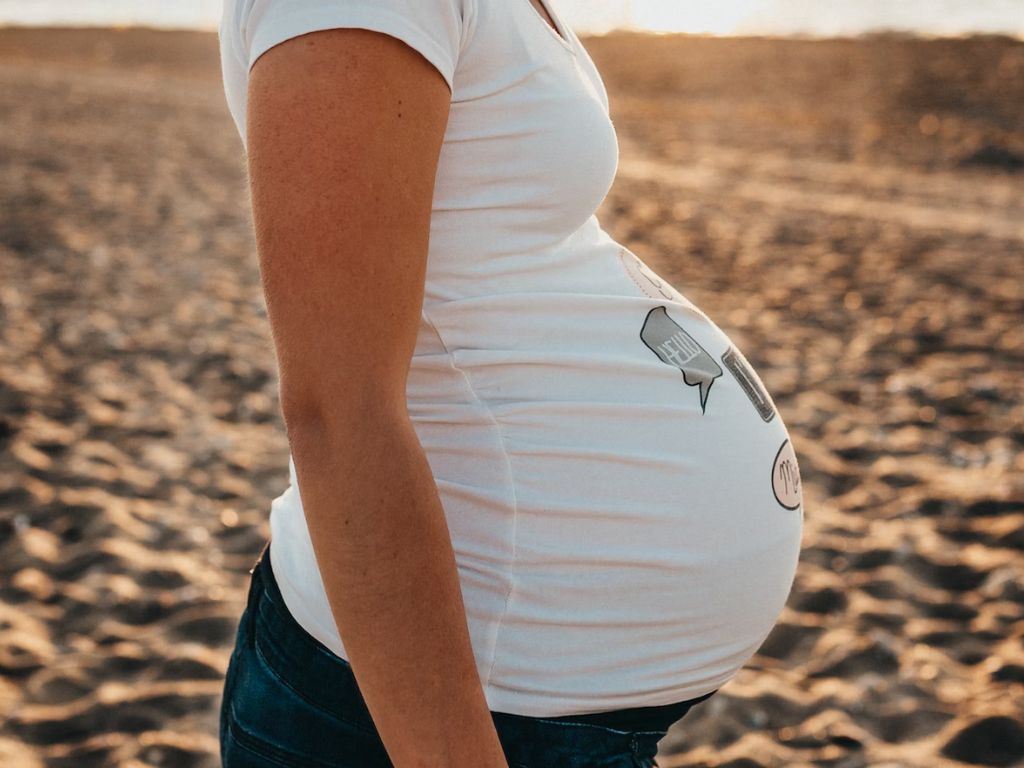Surfing is one of my escapes from the day-to-day routine that’s my weekdays, and I wouldn’t want to give it up for anything. But that’s pregnancy for you. When it begins, one question supersedes every desire: is this safe for me and my child?
It’s a question that many moms-to-be ask themselves, especially if you’re a regular surfer like me. So, what’s the verdict?
Generally speaking, women should avoid surfing during pregnancy. It is risky for the mother and child due to the potential for falls, abdominal trauma, and exposure to harmful bacteria or viruses. However, experienced surfers with low-risk pregnancies may continue surfing with some modifications.
Don’t worry, though, you’re not alone! There are MILLIONS of female surfers in the US, and many have faced or will face the same dilemma, statistically speaking. Check this:
- A survey of the surfing population in 2020 recorded more than 1.3 million female participants. And 24% (~300,000) of them belonged to the 25- to 34-year-old age bracket.
- Another survey by March of Dimes recorded that of all live births in the United States during 2019-2021 (average), 46.7% were to women ages 20-29, and 45.4% were to women ages 30-39.
As I said, you are not alone.
The truth is that surfing while you’re pregnant is a very personal decision that each mother must make. You gotta consider your body shape, size, physique, diet, and overall lifestyle.
Ultimately, the decision should be made in consultation with your doctor based on individual circumstances and risks.
But more importantly, we aren’t asking you to stop on Day 1 anyway. Let me explain.
When should I stop surfing during pregnancy?
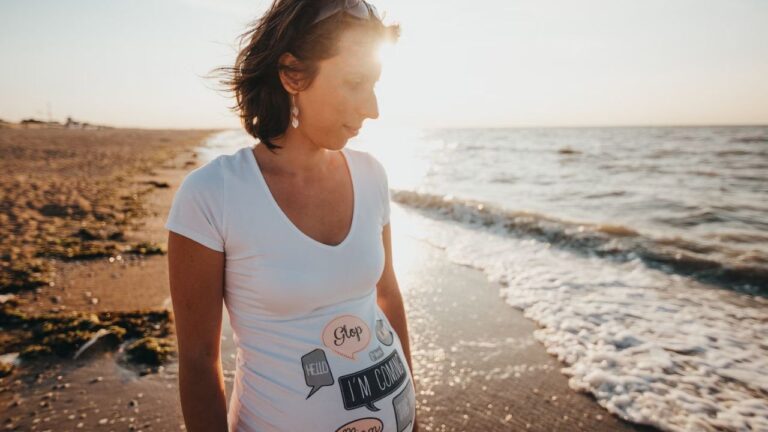
While it’s important to stay active during pregnancy, there may come a time when surfing is no longer safe for you and your baby.
Ideally, pregnant women must take a break from surfing if they experience unexpected bleeding during the second or third trimester, a high-risk pregnancy, decreased fetal movement, extreme fatigue or shortness of breath (frequently), and rough ocean conditions.
Here’s why:
- Second or third-trimester bleeding could be a serious complication such as placenta previa, placental abruption, or preterm labor.
- High-risk pregnancy happens among women with pre-existing medical conditions, multiple pregnancies, or a history of preterm labor.
- Decreased fetal movement could indicate fetal distress, and you may need to be monitored closely.
- Extreme fatigue or shortness of breath indicates that you must take a break from all strenuous activities, including surfing.
- Unstable or rough ocean conditions are unsafe for more reasons than I can list in this article. But experienced surfers already know that.
How to surf safely during pregnancy?
To better understand the issue practically, we spoke with obstetricians and midwives specializing in prenatal care.
If a pregnant woman decides to continue surfing, it’s important to modify her routine to minimize the risks associated with the activity. The doctors we consulted recommended:
- Avoid surfing during the first trimester when the baby is most vulnerable to potential harm.
- Surf only in areas with a lifeguard and avoid areas with large waves or strong currents.
- Wear a wetsuit to protect the baby from cold water.
- Use a larger surfboard to provide more stability and reduce the risk of falls.
- Limit surfing time to 30 minutes or less to prevent overexertion.
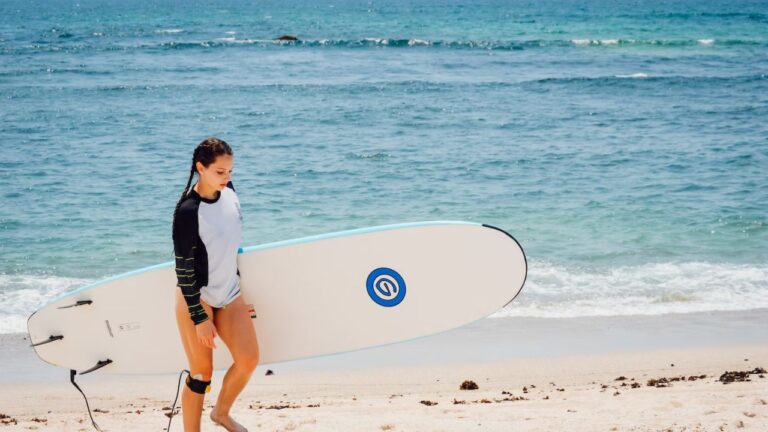
I recently read a story on Reddit about a female surfer who surfed from Day 1 of her pregnancy through birth.
To do that, she had to take precautions like surfing on “small” waves for shorter duration and knee paddle with her “bum up in the air.” Even so, that’s an extremely special case of a healthy mother who is also an experienced surfer.
Many surfers who discussed this story with me knew the healthy part but didn’t consider the experience requirement. To ensure everyone’s safety during pregancy, you should avoid surfing if you’re a newbie or a “vacation surfer.”
What are the risks of surfing while pregnant?
According to obstetricians, three major risks are associated with surfing while pregnant: physical exertion, accidents (falls), and water contamination. The physical exertion can even cause premature labor or water breaking, given how demanding surfing is.
Falls are the most common risk associated with surfing, as they can cause abdominal trauma and potentially harm the baby. The impact on the abdomen from a surfboard can cause serious harm to the developing baby.
Surfing in contaminated water can expose you to harmful bacteria and viruses, such as E. coli and hepatitis. Infections can cause fetal distress or stillbirth, which could be traumatic for the family.
Moreover, pregnant women are more susceptible to dehydration due to increased fluid needs during pregnancy.
How to paddle a surfboard while pregnant?
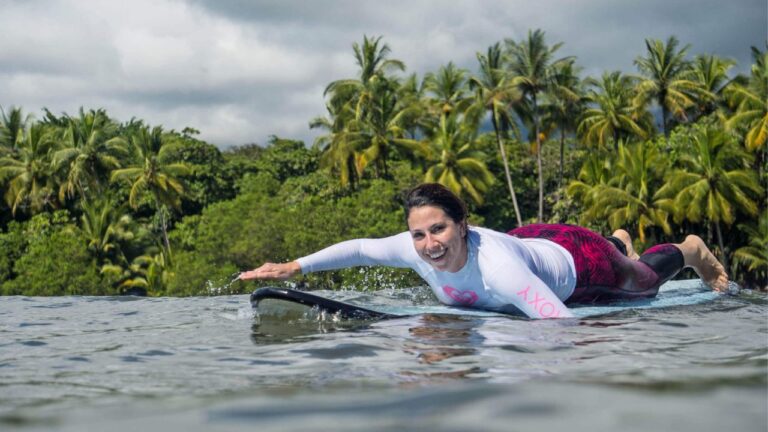
Pregnant women who want to continue surfing must modify their paddling technique to ensure safety and comfort. Here are some tips on paddling effectively while protecting your growing belly.
1. Positioning on the board
Position yourself on the board in a way that evenly distributes body weight. That is, lie flat with your chest and stomach supported by the board.
Your arms should be extended in front, and hands placed slightly wider than shoulder-width apart on the board’s rails.
2. Paddle placement.
Pregnant surfers should avoid placing their paddles too close to their bellies.
Instead, you place your hands and paddles further toward the board’s rails to prevent any accidental impact on the stomach.
3. Modify your paddling technique.
Conventional paddling techniques may not be suitable for you during those nine months. You can use your arms more to propel forward instead of lifting your chest and torso off the board.
Focus on a shorter, faster stroke to avoid overextending your arms or back. You can also use a wider grip on the board’s rails, which may feel more comfortable with a growing belly.
4. Take breaks.
Take regular breaks and rest on the board between sets to catch your breath and regain strength.
5. Use a bigger board.
It can provide more stability and support, which can benefit pregnant surfers. Larger boards are also easier to paddle.
6. Consider a belly band or wetsuit extension.
Wearing a belly band or wetsuit extension can support your growing belly, making you more comfortable and confident in the water.
7. Consult your healthcare provider.
They can provide personalized recommendations based on your pregnancy and health history.
What are the benefits of exercise during pregnancy?
Before we get in, you must focus on “surfing being an extremely personal decision during pregnancy.”
Okay. Enough with the downsides. Let’s talk positively for a minute.
If all goes well, surfing can be a part of your exercise routine. So, what are the benefits, then?
Exercise is essential for maintaining overall health and well-being, especially during pregnancy. Staying active can improve sleep quality, reduce the risk of certain pregnancy complications, and help prepare the body for labor and delivery.
- Improved Cardiovascular Health: Exercise strengthens the heart and improves circulation.
- Reduced Risk of Gestational Diabetes: It’s a condition that can develop during pregnancy and can increase the risk of complications.
- Better Mood: Exercise releases endorphins, which can help improve mood and reduce stress and anxiety.
- Improved Sleep Quality: It can help improve sleep quality and reduce the likelihood of insomnia.
- Reduced Risk of Certain Pregnancy Complications: Exercise during pregnancy has been shown to reduce the risk of certain complications, such as preeclampsia and gestational hypertension.
- Preparation for Labor and Delivery: It can help strengthen the muscles needed for labor and delivery.
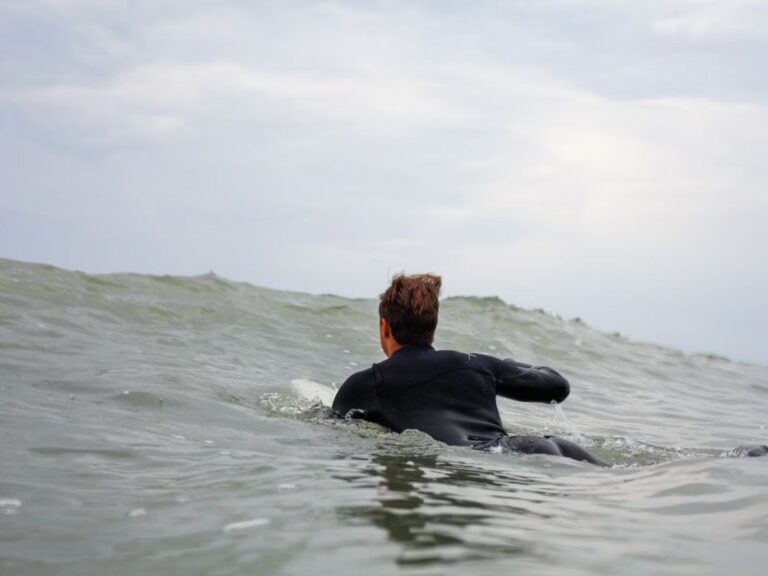
What other physical activities are safe for pregnant women?
1. Swimming: A low-impact exercise that can provide a great cardiovascular workout without putting stress on the joints. It’s also a great way to cool off on a hot day.
2. Prenatal yoga: These classes are specifically designed for pregnant women and can help alleviate common pregnancy-related discomforts.
3. Walking: It’s easy to incorporate into your daily routine, whether a stroll around the neighborhood or a brisk walk on a treadmill at the gym.
4. Cycling: It can provide a great low-impact workout for pregnant women. Just be sure to adjust the seat and handlebars to accommodate your growing belly.
5. Strength training: Strength training can help maintain muscle tone and improve overall fitness during pregnancy.
Important Notes:
Avoid heavy lifting and exercises that strain the abdominal muscles. Work with a personal trainer or take a prenatal strength training class to ensure proper form and prevent overexertion.
Speaking of overexertion, always listen to your body and adjust as needed. Consult your healthcare provider if an activity causes pain, discomfort, or shortness of breath. Also, consult with them before starting anything new in the first place.
If you’re still confused, some real-world experiences could help you. TheIntertia published a great article in 2022 with stories taken from six experienced surfers who faced the same dilemma. You can read their stories to help you decide.
Expert QnA
Q. Are ocean waves safe during pregnancy?
The safety of ocean waves during pregnancy depends on various factors, such as the size and intensity of the waves, the pregnant woman’s physical condition, and her level of surfing expertise.
Q. Can I surf during my entire pregnancy?
The safety of ocean waves during pregnancy depends on various factors, such as the size and intensity of the waves, the pregnant woman’s physical condition, and her level of surfing expertise.
Q. Are there any special precautions I should take if I do decide to surf while pregnant?
Taking extra precautions if you decide to surf while pregnant is important. Some suggestions include wearing a high-quality wetsuit, avoiding crowded surf breaks, and being mindful of the size of the waves. It’s also essential to stay hydrated and well-rested.
Q. Is it safe to paddle out on a surfboard while pregnant?
Paddling out on a surfboard is generally safe during early pregnancy, but listening to your body and being cautious as your pregnancy progresses is important. Consider using a wider, more stable board and paddling with your arms rather than your stomach.

